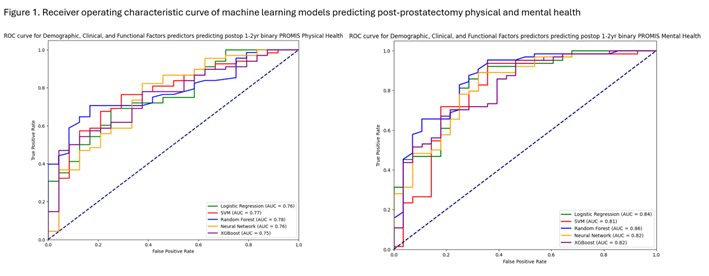Back to 2025 Abstracts
Predicting Post-Prostatectomy Quality of Life: Machine Learning Models for Enhanced Patient-Centered Decision-Making
Zhiyu (Jason) Qian, MD1, Stephan Korn, MD
1, Andrea Piccolini, MD
1, Pietro Brin, MD
1, Hanna Zurl, MD
1, Klara Pohl, MD
1, Alexander P. Cole, MD
1, Quoc-Dien Trinh, MD, MBA
2.
1Brigham and Women's Hospital, Boston, MA, USA,
2University of Pittsburgh, Pittsburgh, PA, USA.
BACKGROUND: Predicting patient-reported quality of life after prostatectomy is challenging due to surgical risks, side effects, and factors such as baseline sexual and urinary function. Misalignment between expected and actual postoperative outcomes can lead to decisional regret. Machine learning may enhance predictive accuracy. We aimed to develop machine learning models to predict postoperative quality of life in men undergoing prostatectomy to aid decision-making.
METHODS: We prospectively collected postoperative quality of life data using Patient-Reported Outcomes Measurement Information System (PROMIS) surveys from men undergoing prostatectomy at our institution (2015-2021), up to 3 years post-surgery. Outcomes were favorable PROMIS physical and mental health measures at 1-3 years post-operation. We collected demographic and clinical data from chart review, and preoperative functional status from the EPIC-26 and PROMIS questionnaire. We built prediction models using logistic regression, neural networks, support vector machines, XGBoost, and random forest, sequentially adding variable categories. Model performance and feature importance were assessed.
RESULTS: Among 458 participants, 348 (76.0%) had favorable long-term post-operative physical health, and 324 (70.4%) had favorable long-term mental health. Models incorporating all feature categories (demographic, clinical, and preoperative functional) achieved the highest c-statistics: 0.78 for physical health and 0.86 for mental health. Random forest models provided the best predictive performance in both cases. Feature importance analysis indicated that preoperative functional metrics and age at surgery were the most significant predictors.
CONCLUSIONS: Using machine learning approaches, we built interpretable prediction models for post-prostatectomy physical and mental health outcomes with high accuracy. These models have the potential to be deployed in preoperative counseling, helping to fine-tune patient and clinician expectations, boost decisional confidence, and reduce regret.

Back to 2025 Abstracts
